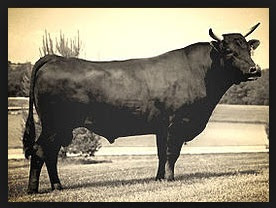WAGYU BREEDING - WHAT BLOODLINE SHOULD I CHOOSE? When it comes to
Wagyu bloodlines, there's a lot to learn and a lot to choose from.
We've listed some of the most common bloodlines below and their traits.
<excerpt from wagyu.org>
Originating from the Hyogo prefecture, these black cattle were
originally used to pull carts and plows so the developed larger
forequarters and lighter hindquarters. They are generally smaller framed
with slower growth rates, but produce excellent meat quality with large
eye muscle and superior marbling. They are thought to be ideal for the
production of F1 cattle for slaughter. The Tajima bloodlines are
generally regarded as producing the best quality meat in all of Japan.
From the Okayama prefecture are medium framed cattle with average growth rates and good meat quality.
From the Tottori prefecture were originally pack animals in the grain
industry, so they are larger animals with straight, strong back lines
and generally good growth rates. However, their meat quality is
variable. Best strain for milking ability. Combinations of all 3 lines
are often used for Fullblood meat production.
The red lines, Kochi and Kumamoto, have been strongly influenced by
Korean and European breeds, particularly Simmental. It is critical for
Wagyu breeders to understand the characteristics of each line when cross
breeding to produce higher quality Wagyu beef.
The production of Wagyu beef in Japan is highly regulated and progeny testing is mandatory. Only the very best proven genetics are kept for breeding. Realising the value of their unique product, the Japanese Government banned the export of Wagyu and declared them a national treasure. However in 1976, four bulls were exported to the United States and Wagyu were graded up from the American cow herd and was the beginning of a two decade window of Japanese genetics entering North America and filtering through to Australia and the rest of the world to today where Wagyu genetics exist on every continent even though actual numbers remain relatively low in comparison to the more popular beef breeds.
<end excerpt>
The Tajima line is the most popular of the bloodlines. Although their frame is smaller, they are some of the best genetics for F1 production when it comes to increasing the profitability of you herd. Keep in mind, wherever you end up sourcing your Wagyu embryos or semen, go for the quality, not the price tag. The quality of the genetics will be the deciding factor of your Wagyu breeding program's return of investment. Don't be shy, reach out and call the ranches or brokers who sell the semen and embryos for Wagyu breeding and ask questions! In the end, the quality of your research will lead to the best purchase for for your operation.
Lolo Trail Ranch is happy to help you in your quest. Give us a call and we'll be happy to speak with you about all things Wagyu, it's what we do! (406) 273-9139
<excerpt from wagyu.org>
Tajiri or Tajima
Fujiyoshi or Shimane
Tottori or Kedaka
Kochi and Kumamoto
The production of Wagyu beef in Japan is highly regulated and progeny testing is mandatory. Only the very best proven genetics are kept for breeding. Realising the value of their unique product, the Japanese Government banned the export of Wagyu and declared them a national treasure. However in 1976, four bulls were exported to the United States and Wagyu were graded up from the American cow herd and was the beginning of a two decade window of Japanese genetics entering North America and filtering through to Australia and the rest of the world to today where Wagyu genetics exist on every continent even though actual numbers remain relatively low in comparison to the more popular beef breeds.
<end excerpt>
The Tajima line is the most popular of the bloodlines. Although their frame is smaller, they are some of the best genetics for F1 production when it comes to increasing the profitability of you herd. Keep in mind, wherever you end up sourcing your Wagyu embryos or semen, go for the quality, not the price tag. The quality of the genetics will be the deciding factor of your Wagyu breeding program's return of investment. Don't be shy, reach out and call the ranches or brokers who sell the semen and embryos for Wagyu breeding and ask questions! In the end, the quality of your research will lead to the best purchase for for your operation.
Lolo Trail Ranch is happy to help you in your quest. Give us a call and we'll be happy to speak with you about all things Wagyu, it's what we do! (406) 273-9139














